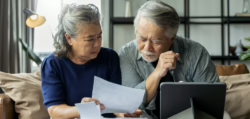
Running out of money – But does it really happen?
They say the secret to a happy life is to only worry about the things within our control. This is an even more interesting concept when applied to funding your retirement. What can you control? And what is outside your wheelhouse? And how does knowing the difference let you sleep better at night?
Last week recent retirees, Teresa and Jack, contacted us to share their concerns. Put simply, they both feel financially overwhelmed. And their major fear of running out of money is now causing arguments about a planned holiday that Jack says they can no longer afford. This discussion is overtaking everything else in their household right now.
However, to others in retirement, their situation could be seen as quite privileged.
They own a three bedroom home outright. And with $1.4 million in joint assets, they are above the asset threshold to qualify for an Age Pension. Their main form of income is a regular payment from an Account Based Pension (ABP), topped up by twice yearly share dividends.
So where’s the problem, you may well ask?
Both Teresa and Jack say that they are feeling rattled by the constant news of price rises, share market volatility and the recent negative returns on super. They also see evidence of this in the drop in value of their own super, which is invested with one of the largest industry funds. So they believe that their savings may not last as long as they will and that this means that they need to cut back hard on their spending now.
This has led Jack, in particular, to the conclusion that they can no longer afford the planned six-week break to Finland to see grandchildren who they haven’t seen since the Covid outbreak. Whilst feeling the pinch every bit as much as Jack, Teresa feels the family reunion is more important than their bank balance and this is causing a lot of friction.
‘Running out of money’ is always a hot topic for retirees, but it can be a misleading concept which encourages concerns out of balance with reality.
Here are the main points to consider if you, too, are feeling under financial pressure and finding it hard to think positively about your future income prospects.
It’s (probably) not going to happen
You are most likely to be worrying needlessly. Very, very few Australians actually run out of money in retirement. The reason is that there is a government guaranteed insurance policy (i.e. the Age Pension) which means you will receive at least a minimum income should your own savings be exhausted. So common is this insurance policy, that 80% of all Australians will receive at least a part Age Pension when they are in their 80s. So whilst you may not preserve all your own super and savings forever, you will not go without an income.
It won’t happen quickly
It is just as rare to suddenly ‘run out’. You can see evidence of dwindling savings and super a long way out. This means you have time to review your retirement settings (where and how you are invested, your income and expenditure) and make adjustments along the way. This is what most people do, they just cut back a little.
There are often other options
If, like Teresa and Jack, you own your own home and you do not wish to apply for an Age Pension you can also consider using equity in your home to boost your retirement income. There are many ways of doing this, including the recently revamped Home Equity Access Scheme (previously the Pension Loans Scheme) which is managed by the Federal Government. We covered home equity is some detail in our ‘Retirement Pillars’ series, so why not read more about how this works?
And are you getting all your entitlements?
We also learned that Teresa and Jack had yet to apply for a Commonwealth Seniors Health Card (CSHC) which gives concessions on PBS medication, healthcare appointments, energy bills and much more). Eligibility for this concession card is based only upon income (not assets) and upon further investigation, we were able to assist Teresa and Jack to apply. The benefits for a couple can be worth up to about $5000 per year, so it is a valuable adjunct to existing income streams for those who are self-funded.
And now the good news
At the end of the discussion with our adviser, both Teresa and Jack felt more comfortable with the ways they can continue to fund their retirement life stages. We suspect that the good news about their eligibility for the CHSC may also have tipped the argument for a holiday in Teresa’s favour, but that’s for them to decide. It is, however, a reminder that some things are more important than money. And grandchildren surely top that list?
If you would like to project the way your funds may last for the coming decades in retirement, why not book a consultation with an adviser who can share our Retirement Spending Guide calculator on screen? They can help you move the levers and see ‘in real time’ the different estimated outcomes depending upon your spending and investment choices?
If you, too, are ready to apply for the CHSC, use our free calculator for an instant eligibility check. And if you want support with the application, we’re here to help with that as well.






I am 71 years of age and in Feb 2022 retired fully from part time casual work. In FY21/22 I will not meet the CHC income test for eligibility. From now on, I will qualify. How long do I have to wait before I can prove my eligibility and apply for a CHC?
Hi Rex, great question on a scenario that many people get into! Thankfully you can apply now rather then wait until the end of the current financial year. You will still need to declare your previous financial year’s earnings however you can also provide a separation certificate (or equivalent) to show that you are no longer earning what you used to and therefore this year you will be under the applicable threshold. We have helped many customers get approved this way.
My husband aged 72 and I am 64 and once I am pension age (67j he will no longer be eligible for his part aged pension. How far out from my turning 67 can I apply for my own CSHC (I currently have a LIHC, guessing it doesn’t just transfer since I have to reapply every year) ) and would my husband also have to apply or is it a straight transfer from his pension health card. Again, same question how far out would he be able to apply for this change?
Hi Marina. Unlike the Age Pension you can’t apply for the CSHC until you reach eligibility age. This is currently 66 1/2 but will be 67 by the time you are eligible. You husband would also need to apply for the CSHC. It is worth getting some advice however as you may find you will be eligible for the Age Pension by the time you reach eligibility age. You joint assets and joint income were part of your husband’s assessment. Some of your assets such as super in the accumulation phase may of course have been excluded from his assessment. You can book a consultation with one of our Advisers if you think you might need some help with this.